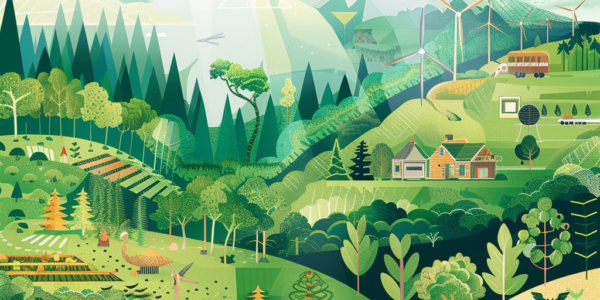The Role of Crustal Carbonate Build-Up in Earth’s Oxygenation
A recent study published in Nature Geoscience sheds light on the role of crustal carbonate build-up as a driver for Earth’s oxygenation, presenting a theoretical framework for the long-term global oxygen, phosphorus, and carbon cycles. The findings reveal that the accumulation of carbonates in the Earth’s crust has a significant impact on the planet’s oxygenation trajectory in both the atmosphere and oceans, providing valuable insights into the complex interplay between geological and biological processes that have shaped Earth’s atmosphere and oceans over billions of years.
Groundbreaking Discovery in Carbon Capture Technology
Scientists have made a groundbreaking discovery in the field of carbon capture, offering new hope in the fight against climate change. A familiar solvent has been found to hold the potential to capture twice as much carbon dioxide (CO2) as previously believed, opening the door to the development of carbon-based materials that could play a crucial role in reducing CO2 emissions. This unexpected finding has the potential to revolutionize carbon capture technology, offering a more efficient and cost-effective solution for reducing CO2 emissions.
Mission Zero Technologies Secures €25.4 Million in Series A Funding for Carbon Removal Mission
London-based Mission Zero Technologies secures €25.4 million in Series A funding to develop mass deployable direct air capture (DAC) product, aiming to recover 1,000 tonnes of atmospheric CO₂ annually. The urgent need to mitigate climate change has propelled the demand for large-scale CO₂ removal, and Mission Zero is committed to democratizing access to sustainable carbon sources. Their technology is cost-effective, energy efficient, and compatible with renewable energy sources, setting them apart in the direct air capture sector.
Peatland Soils Rapidly Altered by Climate Change and Elevated Carbon Dioxide Levels, Study Finds
A recent study has found that peatland soils, crucial for storing carbon, are being rapidly altered by a warmer climate and elevated carbon dioxide levels. The research conducted in northern Minnesota revealed that warmer conditions and increased carbon dioxide led to a rapid breakdown of organic soil components, challenging the traditional belief that complex components of plant-derived soil organic matter would degrade more slowly than simpler components in response to climate change. These findings highlight the vulnerability of peatlands to climate change and the potential impact on carbon storage and greenhouse gas production.
Abatable Report Highlights Critical State of Voluntary Carbon Market
Abatable’s report ‘Abatable Voluntary Carbon Market Developer Overview | 2023-2024’ highlights the pivotal transition of the voluntary carbon market, with a surge in investment and projects, decline in credits issued, dominance of REDD+ projects, and unprecedented activity in the demand side. The report indicates a promising outlook for the future of the market.
Goodfellas Wood Oven Pizza Implements Carbon Fee on Customer Bills
Goodfellas Wood Oven Pizza, a popular restaurant chain in the Greater Toronto Area, has implemented a 2% carbon fee on all customer bills to invest in carbon capture and offset their carbon footprint. The decision has sparked curiosity and discussion among patrons, with some expressing surprise at the charge. Despite initial skepticism, the Canadian Federation of Independent Businesses has clarified the legality of the fee. The restaurant chain has chosen to support Tree Canada’s National Greening program, focusing on reforestation efforts through tree planting. The introduction of the carbon fee has brought attention to the evolving landscape of sustainability initiatives within the business sector.
Researchers Develop Energy-Efficient Strategy for Ethylene Synthesis via CO2 Reduction
Researchers at Université Montpellier and other institutes have developed a new strategy to facilitate the energy-efficient synthesis of ethylene via the reduction of carbon dioxide. Their approach involves functionalizing copper catalysts for CO2 reduction using aryl diazonium salts, aiming to address the modest selectivity for ethylene and improve energy efficiency. This breakthrough is expected to have significant implications for the energy industry and environmental sustainability.
Researchers Propose New Method for Tracking Origins of CO2 Emissions from Streams, Rivers, and Lakes
University of Massachusetts Amherst researchers propose a new method for tracking CO2 emissions from streams, rivers, and lakes, addressing the challenge of accurately measuring and understanding the carbon dioxide released by inland waters. The study, published in Global Biogeochemical Cycles, reveals the impact of carbonate buffering on CO2 emissions, shedding light on the cryptic nature of its production and the difficulty in accounting for it in current climate models.
UCLA and Equatic to Build World’s Largest Ocean-Based Carbon Removal Plant in Singapore
UCLA and Equatic are collaborating to build the world’s largest ocean-based carbon removal plant in Singapore, with the aim of removing 3,650 metric tons of carbon dioxide annually and producing 105 metric tons of carbon-negative hydrogen. The $20 million project is made possible through the support of Singapore’s national water agency PUB, the National Research Foundation (NRF), Singapore, and UCLA’s Institute for Carbon Management (ICM). The groundbreaking technology not only facilitates the removal and durable storage of greenhouse gases but also produces nearly 300 kilograms of carbon-negative hydrogen daily.
Study Challenges Understanding of Soil Microbiome Diversity and Carbon Cycle
A recent study from the University of Vienna challenges existing understanding of soil microbiomes’ impact on the global carbon cycle. The research found that warmer soils increase microbiome diversity, affecting carbon release. This suggests that carbon release is not solely due to accelerated microbe growth, but also from previously dormant bacteria. The study’s lead author emphasized the complexity of soil microbiome dynamics in response to temperature changes.










